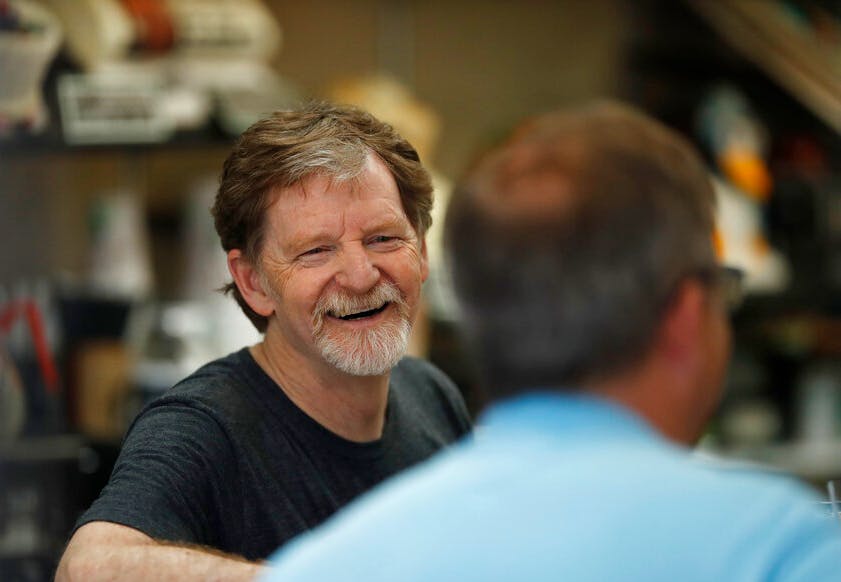Colorado Baker Fighting Ruling Over Gender Transition Cake
Lawyer for the Christian baker contends forcing him to create a cake with a message contrary to his religious beliefs amounts to forcing him to say something he does not believe, violating his right to free speech.

DENVER — The Colorado baker who won a partial Supreme Court victory after refusing on religious grounds to make a gay couple’s wedding cake a decade ago is challenging a separate ruling he violated the state’s anti-discrimination law by refusing to make a cake celebrating a gender transition.
A lawyer for Jack Phillips on Wednesday urged Colorado’s appeals court — largely on procedural grounds — to overturn last year’s ruling in a lawsuit brought by a transgender woman.
The woman, Autumn Scardina, called Mr. Phillips’ suburban Denver cake shop in 2017 requesting a birthday cake that had blue frosting on the outside and was pink inside to celebrate her gender transition. At trial last year, Mr. Phillips, a Christian, testified he did not think someone could change genders and he would not celebrate “somebody who thinks that they can.”
A lawyer representing Phillips from the conservative Christian legal advocacy group Alliance Defending Freedom, Jake Warner, said the ruling was wrong. He said requiring Mr. Phillips to create a cake with a message contrary to his religious beliefs amounts to forcing him to say something he does not believe, violating his right to free speech.
Judge Timothy Schutz noted Mr. Phillips’ wife initially told Scardina the bakery could make the cake before Scardina volunteered that the design was meant to celebrate her gender transition.
One of Ms. Scardina’s lawyers, John McHugh, said she did not ask the shop to endorse her idea, just sell her a cake that they would sell anyone else. He said whether or not Mr. Phillips sells a cake to someone cannot depend on what the client tells him when he is making the cake.
Both Ms. Scardina and Mr. Phillips spoke outside the court of larger issues involved. Ms. Scardina said the case was about the “dignity of LGBTQ Americans and Coloradans and the rule of law.” Mr. Phillips said he was fighting for the rights of all Americans to live according to their consciences “without fear of punishment” by government.
In 2018, the Supreme Court ruled that the Colorado Civil Rights Commission had acted with anti-religious bias in enforcing the anti-discrimination law against Mr. Phillips after he refused to bake a cake celebrating the wedding of Charlie Craig and Dave Mullins in 2012. The justices called the commission unfairly dismissive of Mr. Phillips’ religious beliefs.
The high court did not rule then on the larger issue of whether a business can invoke religious objections to refuse service to LGBTQ people. But it will get another chance when it hears a different case in coming months challenging Colorado’s anti-discrimination law.
The case involves Denver-area designer Lorie Smith, who wants to offer wedding website services but says her Christian beliefs would lead her to decline any request from a same-sex couple to design a wedding website. She also wants to post a statement on her website about her beliefs but says Colorado’s law violates her free speech and religious rights.
In agreeing to take the case, the Supreme Court said it would only examine the free speech issue.
Ms. Smith is also defended by Alliance Defending Freedom. Mr. Phillips’ lawyers unsuccessfully asked Colorado’s appeals court to delay hearing arguments in his challenge until after the Supreme Court rules in Ms. Smith’s case.
Ms. Scardina, an attorney, attempted to order her cake on the same day in 2017 that the Supreme Court announced it would hear Mr. Phillips’ appeal in the wedding cake case. Ms. Scardina testified she wanted to “challenge the veracity” of Mr. Phillips’ statements that he would serve LGBT customers.
Before filing suit, Ms. Scardina first filed a complaint against Mr. Phillips with the state and the civil rights commission, which found probable cause that Mr. Phillips had discriminated against her. Mr. Phillips then filed a federal lawsuit against Colorado, accusing it of a “crusade to crush” him by pursuing the complaint.
